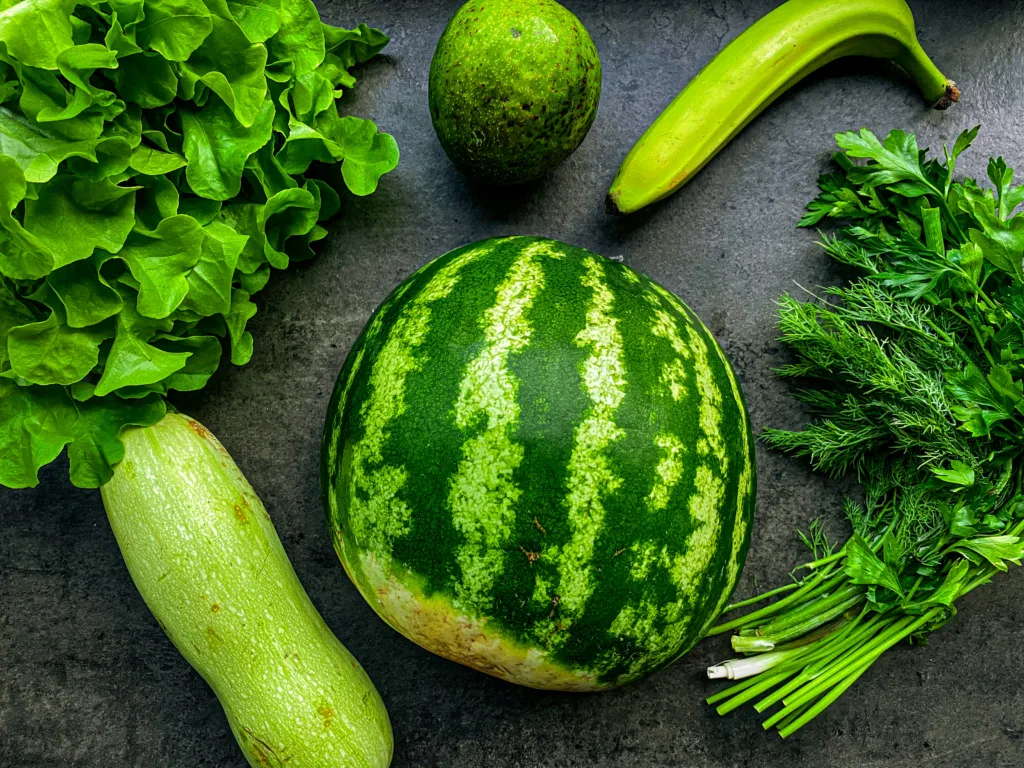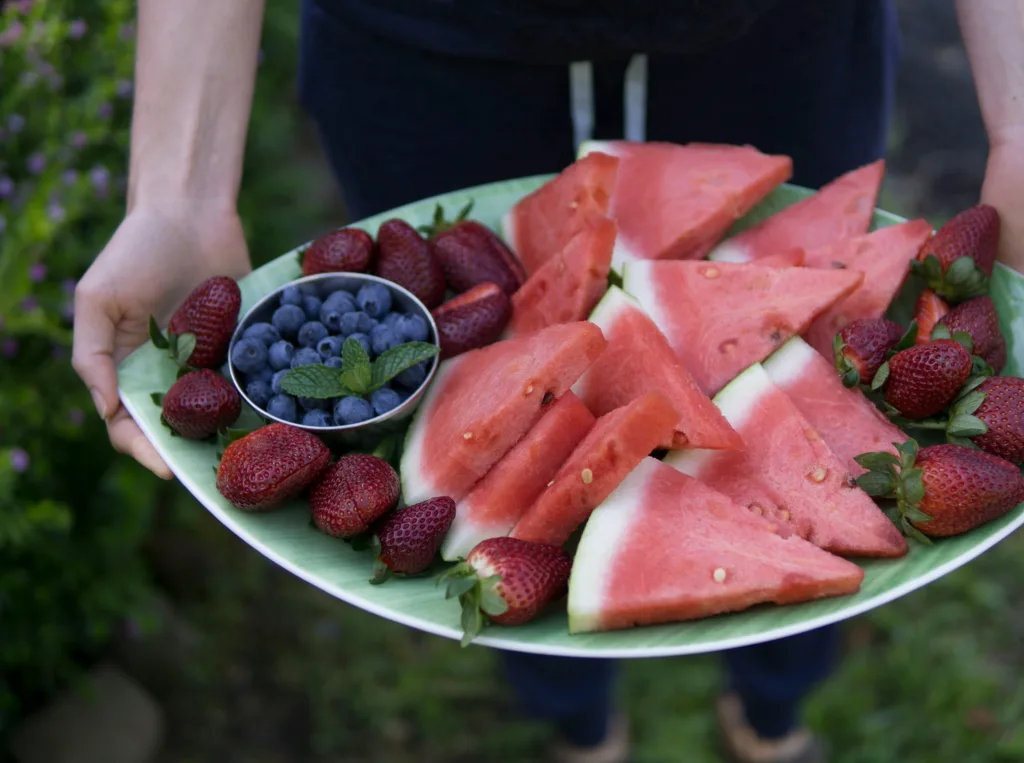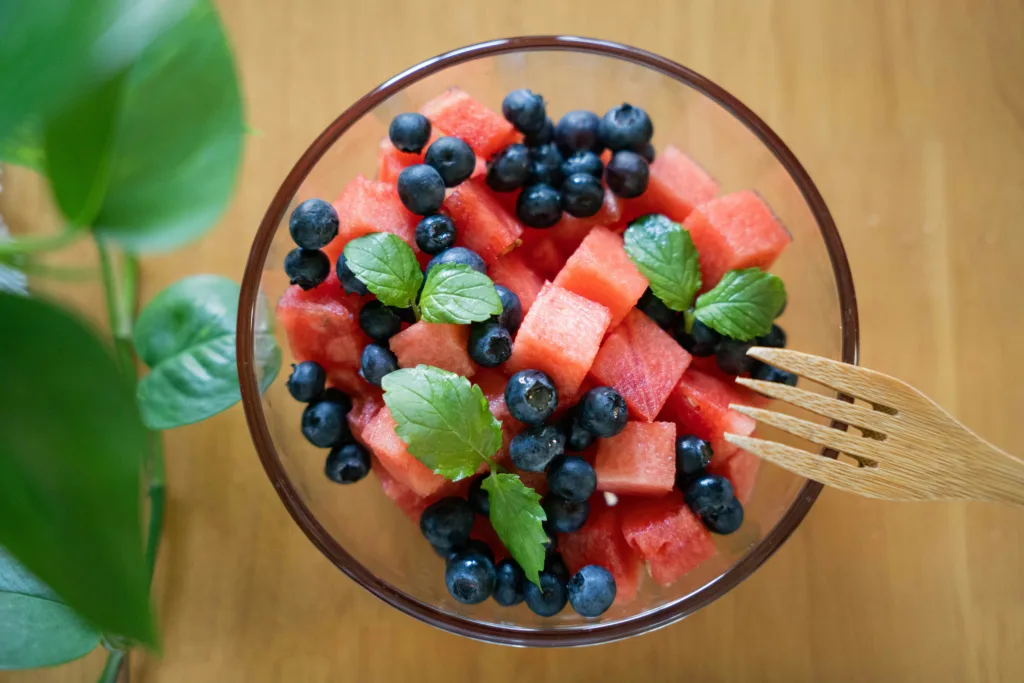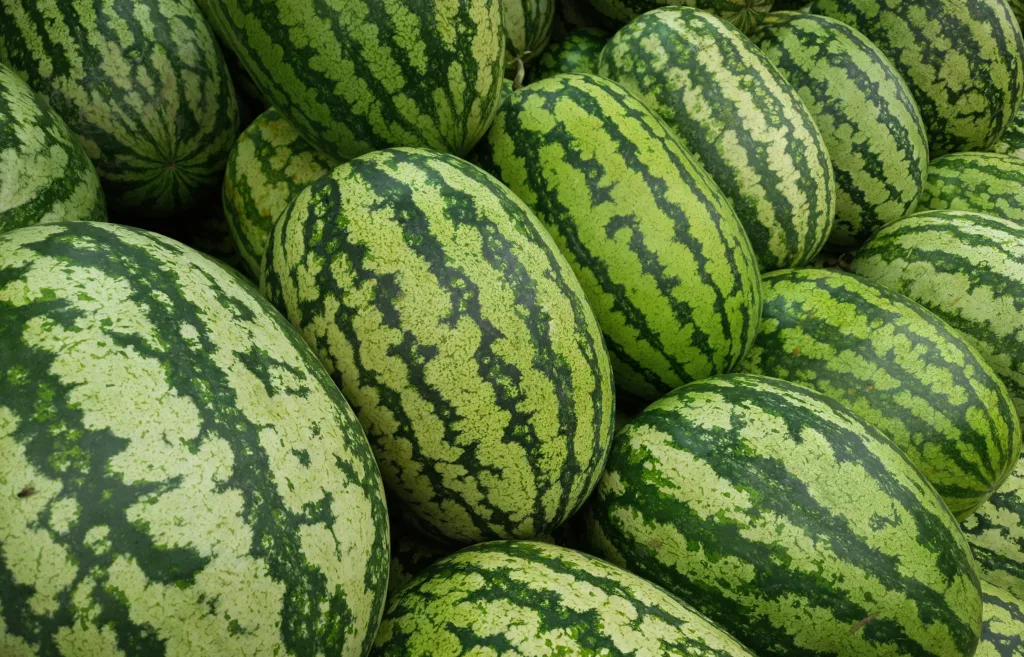Watermelon, with its vibrant red flesh and juicy sweetness, is a quintessential summer treat loved by many around the world. Beyond its delightful taste and refreshing nature, watermelon offers an array of health benefits and versatile uses that make it a valuable addition to any diet. In this article, we delve into the nutritional profile of watermelon, explore its numerous health benefits, and highlight creative ways to incorporate this delicious fruit into your daily routine.

Nutritional Profile of Watermelon
Before we delve into its health benefits, let’s take a look at the impressive nutritional profile of watermelon:
- Hydration: With its high water content of approximately 92%, watermelon is an excellent hydrating fruit, making it ideal for staying refreshed during hot summer days.
- Vitamins and Minerals: Watermelon is a good source of essential vitamins and minerals, including:
- Vitamin C: An antioxidant that boosts immune function and promotes skin health.
- Vitamin A: Important for vision, immune function, and skin health.
- Potassium: Essential for maintaining proper heart function and regulating blood pressure.
- Magnesium: Aids in muscle and nerve function, as well as energy production.
- Antioxidants: Watermelon contains lycopene, a powerful antioxidant responsible for its vibrant red color. Lycopene has been linked to reduced risk of certain cancers and cardiovascular diseases.
- Low in Calories: Despite its sweet taste, watermelon is relatively low in calories, making it a guilt-free snack option for those watching their calorie intake.

Health Benefits of Watermelon
1. Hydration and Electrolyte Balance
Watermelon’s high water content makes it an excellent hydrating fruit, aiding in maintaining optimal hydration levels and electrolyte balance in the body. This is particularly beneficial during hot weather or after vigorous exercise sessions when fluid loss and electrolyte depletion occur.
2. Heart Health
The presence of lycopene, citrulline, and other heart-healthy compounds in watermelon contribute to its potential benefits for cardiovascular health. Lycopene, in particular, has been associated with reducing inflammation and oxidative stress in the cardiovascular system, thereby lowering the risk of heart disease. Citrulline, meanwhile, may help improve blood vessel function, leading to better blood flow and lower blood pressure levels.
3. Anti-Inflammatory Properties of Watermelon
Watermelon contains various compounds with anti-inflammatory properties, including lycopene and vitamin C. Chronic inflammation is linked to the development of numerous diseases, including arthritis, diabetes, and heart disease. Consuming foods rich in anti-inflammatory compounds, such as watermelon, may help mitigate inflammation in the body, reducing the risk of these conditions.
4. Improved Digestion
The fiber content in watermelon promotes healthy digestion by adding bulk to the stool and supporting regular bowel movements. Adequate fiber intake is essential for maintaining gastrointestinal health, preventing constipation, and reducing the risk of digestive disorders such as diverticulitis and irritable bowel syndrome.
5. Muscle Recovery
Watermelon contains the amino acid citrulline, which has been studied for its potential role in muscle recovery and reducing exercise-induced muscle soreness. Citrulline is believed to enhance blood flow to muscles, speeding up the delivery of oxygen and nutrients needed for repair and recovery after physical activity.
6. Skin and Hair Health
The vitamins A and C found in watermelon play crucial roles in skin and hair health. Vitamin C is necessary for collagen synthesis, a protein that provides structure and elasticity to the skin. Meanwhile, vitamin A supports the production of sebum, an oily substance that keeps the skin and scalp moisturized. Including watermelon in your diet can contribute to healthy, glowing skin and lustrous hair.
7. Weight Management
Despite its sweetness, watermelon is relatively low in calories and fat while being high in water and fiber. These characteristics make it a satisfying snack option for those looking to manage their weight. The high water content of watermelon helps promote satiety, keeping you feeling full and satisfied with fewer calories, while the fiber content aids in digestion and supports a healthy metabolism.

Creative Uses of Watermelon
Beyond simply slicing and enjoying it fresh, watermelon can be incorporated into various dishes and beverages to add flavor and nutrition:
- Watermelon Salad with a Twist: Elevate your salad game by combining juicy watermelon chunks with creamy feta cheese, fragrant basil leaves, crunchy cucumber slices, and tangy balsamic glaze. The contrasting flavors and textures create a refreshing and satisfying dish that’s perfect for summer gatherings and picnics.
- Watermelon Gazpacho: Beat the heat with a chilled watermelon gazpacho soup. Blend ripe watermelon with ripe tomatoes, crisp bell peppers, zesty lime juice, and a hint of jalapeno for a sweet and savory soup that’s bursting with flavor. Serve it as a starter or light meal for a refreshing and nutritious summer treat.
- Grilled Watermelon Skewers: Impress your guests with grilled watermelon skewers that marry sweet and smoky flavors. Simply thread watermelon cubes onto skewers, brush them with a mixture of honey, lime juice, and a pinch of chili powder, then grill until caramelized and slightly charred. The result is a mouthwatering appetizer or dessert that’s sure to be a hit at your next barbecue.
- Watermelon and Feta Bruschetta: Put a fruity twist on classic bruschetta by topping toasted baguette slices with a mixture of diced watermelon, crumbled feta cheese, chopped mint, and a drizzle of balsamic reduction. The combination of sweet watermelon, salty feta, and aromatic mint creates a flavor explosion that’s perfect for summer entertaining.
- Watermelon Smoothie Bowl: Start your day on a refreshing note with a watermelon smoothie bowl topped with an assortment of fresh fruits, nuts, seeds, and granola. Blend frozen watermelon chunks with coconut water, banana, and a handful of spinach for a vibrant green smoothie base, then layer it in a bowl and top with your favorite toppings for a nutritious and Instagram-worthy breakfast or snack.
- Watermelon and Cucumber Cooler: Stay cool and hydrated with a refreshing watermelon and cucumber cooler. Blend chilled watermelon chunks with crisp cucumber slices, fresh lime juice, and a handful of mint leaves until smooth. Strain the mixture to remove any pulp, then pour it over ice and garnish with cucumber ribbons and mint sprigs for a revitalizing drink that’s perfect for sipping poolside or on a hot summer day.
- Watermelon Salsa with a Kick: Add a burst of flavor to your meals with homemade watermelon salsa. Combine diced watermelon with chopped jalapenos, red onion, cilantro, lime juice, and a pinch of salt for a sweet and spicy salsa that pairs perfectly with grilled fish, chicken, or tacos. Serve it as a refreshing appetizer or condiment to brighten up any dish with its vibrant colors and bold flavors.
Conclusion
Watermelon is not only a delicious and refreshing fruit but also a nutritional powerhouse packed with vitamins, minerals, and antioxidants. From promoting hydration and heart health to aiding in digestion and weight management, the health benefits of watermelon are plentiful. Incorporating watermelon into your diet through creative recipes and snack ideas is a tasty way to reap its numerous health rewards while staying cool and refreshed during the summer months. So, next time you’re craving a sweet and juicy treat, reach for a slice of watermelon and enjoy its wholesome goodness.
Topics covered:
- What is Watermelon?
- What are key nutrients in Watermelon?
- What are health benefits of Watermelon?
- What are uses of Watermelon?
- Watermelon Recipes








4 thoughts on “Health Benefits and Uses of Watermelon: A Refreshing and Nutrient-Packed Fruit”